- Home
- Robert B. Parker
Melancholy Baby Page 4
Melancholy Baby Read online
Page 4
“I don’t,” I said.
“What has changed?”
“Changed? For God’s sake, Doctor, you know what has changed. Richie got married.”
Dr. Silverman nodded.
“And what does that have to do with you and Tony Gault?”
“Well, for God’s sake, I can’t . . .”
Dr. Silverman was quiet, her big eyes resting on me without movement, her hands settled quietly in her lap. She had a wide mouth and her lips were full. She was wearing a dark suit today. She didn’t wear a wedding ring. I wondered if she was married. I wondered if she had a boyfriend. I wondered if she colored her hair. She must. She was definitely old enough to be coloring her hair. Great body, though. She must work out a lot. She probably had a boyfriend. Probably some Harvard geek.
Dr. Silverman smiled and tilted her head forward a little.
“You can’t . . . ?” she said.
“Well, I mean I don’t want to get involved with Tony Gault.”
“Had that been a problem previously?”
“Involvement?” I said.
“Has he previously wanted more than intimacy?”
“No.”
“Then?” Dr. Silverman said. “This time?”
“Well, Richie was married.”
“Did Tony know that?”
“No.”
Dr. Silverman was quiet for a moment. So was I. Then she leaned toward me a little more and smiled widely. It was a genuine smile, full of warmth and interest.
“So,” Dr. Silverman said. “What’s up with that?”
I was quiet for a while.
Then I said, “But I knew that.”
Dr. Silverman nodded.
“You’d think it would be the other way around,” I said.
Dr. Silverman didn’t say anything.
“You’d think once Richie was gone,” I said, “that I’d be more willing.”
Dr. Silverman was quiet.
“But I’m not,” I said.
Dr. Silverman might have nodded. It was so slight a nod that I wasn’t sure.
“Not just Tony,” I said. “I don’t feel like I want to be intimate with anybody.”
Another nod . . . maybe.
“I have been . . .” I said. “I’ve been intimate with a number of men since the divorce.”
Nod?
“Including Richie,” I said.
Dr. Silverman seemed comfortable, tipped back in her chair slightly. Her hands were motionless in her lap. She seemed interested, in a pleasant, noncommittal kind of way. She was agreeable, but she was silent. I wanted her to talk. I wanted her to explain me. I didn’t know what to say. Dr. Silverman didn’t seem to mind. She was comfortable with the silence.
“Richie was protection,” I said.
She leaned forward a little.
“Tell me about that,” she said.
“As long as he was . . . as long as I could love him, even though we were divorced, I was safe. I could go out with other men, have sex, whatever. And I would not have to worry about anything beyond that.”
“What might be beyond that?” Dr. Silverman said.
I was quiet. Then I said, “Marriage, I guess.”
11
Of the twelve names I had wrenched from Sarah, four were still around. One of them was Bobby O’Brien, the name she’d mentioned first. I talked with him at the pub in the student union at Templeton College.
“You sure don’t look like a detective,” Bobby said.
“I’m in disguise,” I said.
“It’s working good,” Bobby said.
He was a chunky kid with a rust-colored crew cut and a flat nose.
“You look like a hockey player,” I said.
“Yep.”
“How are you in the corners?” I said.
Bobby grinned. “Terrifying,” he said.
“You went to school with Sarah Markham,” I said.
“Sarah? Sure. First grade on.”
“Do you see much of her anymore?”
He shook his head.
“Tell me about her.”
“Whaddya want to know?” Bobby said.
“Anything you can tell me. What she was like, what her family is like, anything that strikes you.”
“And why do you want to know?”
I thought about it. No one had sworn me to secrecy, and the more the question was out there, the more chance that someone might think of something.
“We’re trying to establish if she’s adopted.”
“Adopted?”
“Yes.”
“She doesn’t know?”
I shook my head.
“Her mother and father don’t know?”
“They say she’s not adopted. We’re just trying to establish it for sure.”
“Man,” Bobby said. “That’s weird.”
“Because?” I said.
“I mean, you live your whole life with your mother and father, and then you all of a sudden think maybe they’re not? What the hell is that about?”
“We’re looking into that,” I said. “What was she like in school?”
“Fine. She was pretty smart, and kind of popular and, you know, was part of the right group until maybe seventh grade.”
“And then?”
“She started hanging with the frazz-outs.”
“Frazz-outs?”
“Losers, dopeheads, dropouts, the bad crowd.”
“Oh,” I said, “those frazz-outs. She do drugs?”
Bobby looked down at his thick, freckled hands resting in front of him on the chipped Formica tabletop.
“I don’t like talking about her,” he said.
“Why not.”
“It feels like I’m ratting her out.”
“I work for her,” I said. “She’s paying me to ask these kinds of questions.”
He nodded.
“Yeah, she did a lot of drugs. Still does, I’m pretty sure.”
“Was she . . . sexually promiscuous?”
“She was pretty slutty in high school,” he said.
“Did you ever go out with her?”
“A little,” he said.
“Did you ever sleep with her?”
“Hey.”
“I told you,” I said, “I’m a detective.”
He nodded again.
“Yeah. I slept with her. Once. Then it was over. She wouldn’t go out with me again.”
“Did she not want you to sleep with her?”
“That’s the funny part,” Bobby said. “She was hot. It was her idea, but after we did it, she didn’t want to see me anymore.”
“What did she say?”
“That’s how weird it was. She didn’t say anything. She just got up, put herself back together, you know, got out of the car, and walked away.”
“She told me she stopped seeing you because you got a girlfriend.”
“I got a girlfriend, but that was a long time after I had anything to do with Sarah.”
“Do you know if she was this way with anyone else?”
“Lotta guys,” Bobby said. “It was like she wanted you to do it to her, and when you did it, she didn’t like you anymore.”
“To her,” I said.
“Whaddya mean?”
“It sounds as if she didn’t enjoy it,” I said.
“No. Not when it was happening, just before.”
“Is there someone I could talk with who knows her now?”
“Her college roommate. They go to Taft together.”
“And her name is?”
“Polly Murphy,” he said. “What’s all this got to do with whether her parents adopted her or not?”
“I have no ide
a,” I said.
12
I talked with Bobby O’Brien for another half hour but didn’t learn anything more. Over the next few days, I talked with the other classmates she had mentioned, and a few she hadn’t. Several of them agreed with Bobby, that she had changed when she was thirteen. No one had any theories why. No one could give me any information about her parentage. No one had ever heard her question it.
I met Sarah for coffee at Taft. Sarah took hers black.
“What happened to you,” I said, “when you were thirteen?”
“Huh?”
“When you were thirteen, in the seventh grade, something happened.”
“What?”
“I was hoping you’d know,” I said.
Sarah lit a cigarette and took in a lot of smoke and let it out, slowly looking at it as it floated between us.
“I don’t know what you’re talking about,” she said. “You find anything out yet about my parents?”
“Not much,” I said.
“Well, whyn’t you do that and stop nosing around about me in the seventh grade?”
“Something happen that made you start to wonder about your parents?”
“In the seventh grade?”
“Yes.”
“No,” she said. “I always knew they weren’t my parents.”
I nodded. Sarah drank some black coffee. I sipped some of mine. Even with milk and two sugars, it was harsh and unpleasant. Drunk black, it must have been appalling.
“You just knew,” I said.
“Yes. I told you that. I always knew. You think I wouldn’t know. You know things like that.”
I looked at my coffee. I didn’t drink it.
“Sarah?” I said.
“Sarah what?” she said, and dropped her cigarette butt forcefully into her coffee. “Why don’t you stop bugging me like I did something bad. I didn’t do anything wrong. Whyn’t you find out what you’re supposed to find out?”
“We’re not supposed to be adversaries,” I said.
“Well, then, stop snooping on me,” Sarah said.
She lit another cigarette.
“Stop snooping on me,” she said.
I nodded. Tears began to well up in Sarah’s eyes. She started to cry in little soft gasps. I put a hand out and patted her arm. She yanked the arm away and hugged herself. I tried to feel bad for her, and couldn’t. There was nothing in our conversation that constituted a reasonable basis for crying. She was always on the verge of hysteria.
“I won’t snoop on you,” I said.
It didn’t slow her much. She cried and smoked and didn’t say anything. I sat and waited and didn’t say anything, either.
Everything about Sarah and her parents seemed fraudulent. And more than that, insubstantial, like something that had been built on the cheap, with shoddy materials and no craft, to conceal something unhealthy and mean.
It’s not like my life is going really swell, either, honey.
I shook my head. Stop it. There was nothing in that direction that would do anyone any good. After a while she stopped crying, and even let me pat her forearm a couple times. She lit another cigarette, and then stood up quite suddenly.
“I have to go now,” she said, and turned and walked away.
Which is probably what I should have done.
13
In the bright morning, with the sun streaming through my skylight, as I drank coffee, with Rosie watching closely, I sat at my kitchen table and started on the phone. By the time I got through, it was late afternoon. I had drunk too much coffee. The sun had moved to the west. And I had talked with the American Federation of Television and Radio Artists’ New York office, its LA office, the media columnists in both Chicago papers, a guy at WGN who had a late-night jazz show and was said by one of the media columnists to know everyone who’d worked in radio in Chicago since Marconi, and a woman I’d known in art school a long time ago, who had since married and moved to Chicago. As far as anyone knew, no one named George Markham had ever worked in radio in Chicago.
Late in the afternoon, eastern daylight saving time, when it was already getting dark in Boston, however, a particularly diligent clerk in the Los Angeles AFTRA office found a George Markham who had worked at a radio station in the Quad Cities in 1982. I called the radio station and got a recorded message. If I wanted to connect with the Dave Dixon show and be part of the Talk of Quad Cities, I could call an 800 number. I was pretty sure Dave wouldn’t be helpful.
Rosie was sitting, staring at the kitchen counter. I got up and fed her and poured myself some wine and went back to the table and looked out the window. Four stories down, some headlights moved slowly toward Fort Point Channel. People going home to supper. There was some neon in a sandwich shop window down the block. I got up and walked down the length of my loft and looked for a time at the painting I was working on, of the South Station facade. I had no idea if it was good or not. Once I started a painting, I lost all ability to judge it. Maybe if I did enough paintings and sold them, I’d be able to trust my instincts and be less uncertain. Now all I could do was plow along.
Except for the noise Rosie made eating her supper, the loft was silent. I drank the rest of my wine and walked back to the kitchen area and filled the glass again. I thought about Dr. Silverman. There was something about her, some sort of unspoken energy. I felt like I might like her. If she had a boyfriend, maybe he wasn’t a Harvard geek.
I drank some wine. Rosie finished her supper and came across the loft and jumped on the bed. I walked over and patted her. She rolled over on her back so I could rub her stomach.
“I can too have a relationship,” I said.
I sat for a while, patting her and drinking my wine. Then I got up again and walked to the window and looked out some more, at nothing much.
Obviously, there was something wrong in the Markham household if George had lied about where he worked. Of course it could be another George Markham . . . in the same business . . . in the same state . . . during the time when Sarah was born.
I went to the counter and poured some more wine.
It was a given that I loved Richie. I had loved him since I met him, and I loved him now. So tell me, Doctor, why did I divorce him? Maybe I should be first asking why I married him? Okay, doctor. I married him because I loved him . . . or because he loved me . . . or because he wanted to marry me so much . . . or if I hadn’t married him, I’d have lost him. So I had to marry him, even though I didn’t want to get married . . . and I was right: I shouldn’t be married. Why not? What was her first name? Susan. You tell me, Dr. Susan. Isn’t that what you’re supposed to do? No, I know, you’re supposed to help me answer that. . . . God, you are in my head already. Asking why I married him brings me right around to asking why I divorced him.
I could see my reflection in the dark window. I made a toasting gesture at me.
Maybe you’re pretty smart, Dr. Susan. . . . Maybe I’m pretty smart, too. . . . Maybe we’ll figure this out. . . . Maybe I’ll be intimate with somebody. . . . Maybe Richie’s new marriage won’t work. . . . Maybe it won’t matter, because I can never be with somebody. . . . Maybe I’m drunk.
I looked at myself in the glass for a little bit longer, and then I went to the sink and threw my wine away and walked to the bed and lay down, still dressed, and went to sleep with Rosie.
14
I called Richie on his cell phone. “I have to go out of town for a few days,” I said. “Could you take Rosie?”
“Sure, bring her over,” Richie said. “It’s time for my custody days, anyway.”
I didn’t want to bring her over. I didn’t want to encounter my replacement.
“You’re in Marblehead now?”
“Yep. You need the address?”
I knew the address.
“Yes,” I said. “You’d better give it
to me.”
He did.
“Are you coming out now?”
“Yes. Be there in an hour.”
“Okay,” Richie said. “I’ll wait for you.”
I knew why he was waiting, so I wouldn’t have to leave Rosie with his new wife, whom I’d never even met. Maybe she wouldn’t be there.
It took less than an hour, through the Ted Williams Tunnel and up Route 1A. I got there early. Richie had a big house up in the rocks with a view of the ocean. I had never been there. Whenever Rosie visited, Richie had always picked her up on his way home. I drove past the house and U-turned and parked where Rosie and I could look at the ocean near Preston Beach. I had left home at 9:15. It was now only ten minutes to ten. I would have died before I would have arrived in less than an hour. There were twenty-five minutes to kill. The day was brisk and sunny with some wind. The water looked bright and cold. Rosie had gotten down on the floor and curled up tightly, near the heater vent, and gone to sleep. A couple gulls lingered in the air above the interface of beach and ocean. There were always gulls.
At 10:13, I put the car in gear and backed out and drove to Richie’s house. At 10:17, I was parked at the top of his steep driveway. I felt as if my soul had fallen into something bottomless. Rosie knew where she was and pranced as we went to the front door, with her tail wagging very fast. When Richie opened the door, she was ecstatic and did several bull terrier spins. Behind Richie was a slender blonde woman. The blonde crouched down, and Rosie rushed over and squeaked a little. The blonde put her face down, and Rosie lapped it. Squeaks and a lap—Sweet Jesus!
“Sunny, this is my wife, Kathryn,” Richie said. “Kathryn, Sunny Randall.”
Kathryn stood. Christ, I thought, she looks like me. We shook hands.
“It’s lovely to finally meet you,” Kathryn said.
“And it’s lovely to meet you,” I said.
I hated her with every strand of DNA in my being. And, of course, she knew it.
“Would you care for a house tour?” Kathryn said. “We’ve just done some rehab upstairs.”
“I’d love to,” I said. “But I have to catch a plane to Chicago.”
“Oh, well, next time.”
“Sure,” I said.

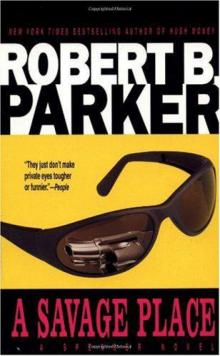 A Savage Place s-8
A Savage Place s-8 Appaloosa / Resolution / Brimstone / Blue-Eyed Devil
Appaloosa / Resolution / Brimstone / Blue-Eyed Devil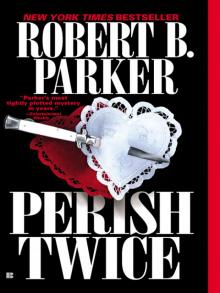 Perish Twice
Perish Twice Spare Change
Spare Change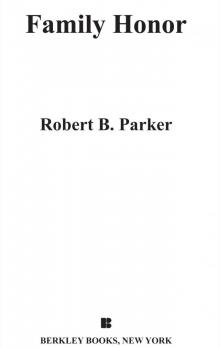 Family Honor
Family Honor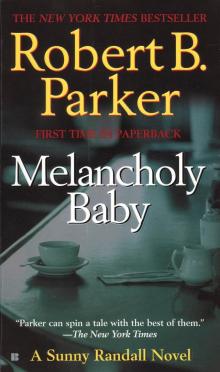 Melancholy Baby
Melancholy Baby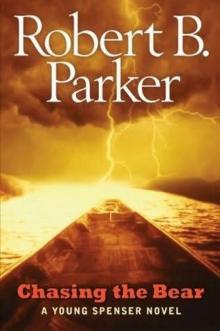 Chasing the Bear
Chasing the Bear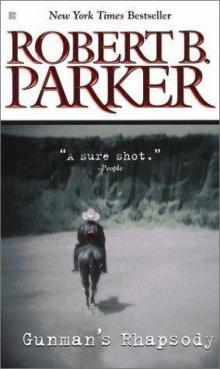 Gunman's Rhapsody
Gunman's Rhapsody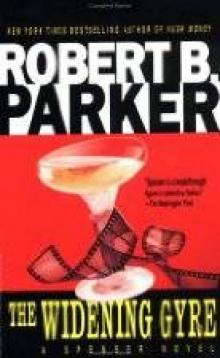 The Widening Gyre
The Widening Gyre Thin Air
Thin Air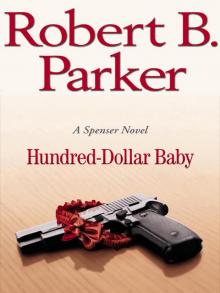 Hundred-Dollar Baby
Hundred-Dollar Baby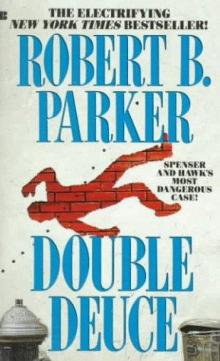 Double Deuce s-19
Double Deuce s-19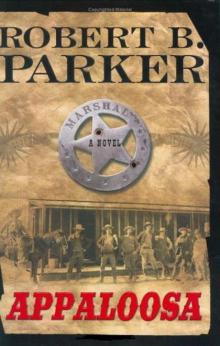 Appaloosa vcaeh-1
Appaloosa vcaeh-1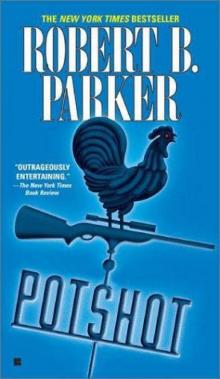 Potshot
Potshot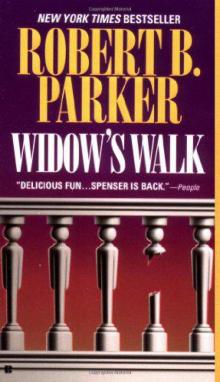 Widow’s Walk s-29
Widow’s Walk s-29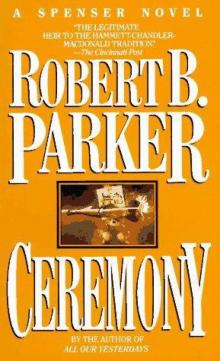 Ceremony s-9
Ceremony s-9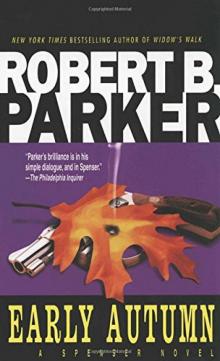 Early Autumn
Early Autumn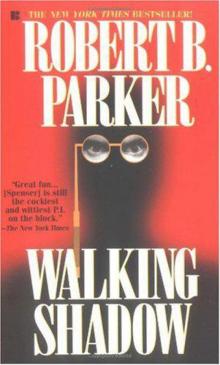 Walking Shadow s-21
Walking Shadow s-21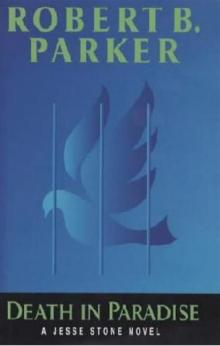 Death In Paradise js-3
Death In Paradise js-3 Shrink Rap
Shrink Rap Blue-Eyed Devil
Blue-Eyed Devil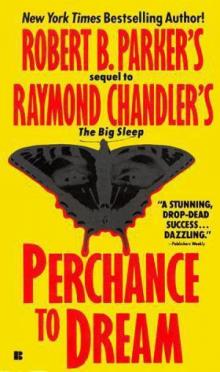 Perchance to Dream
Perchance to Dream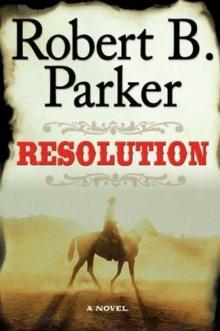 Resolution vcaeh-2
Resolution vcaeh-2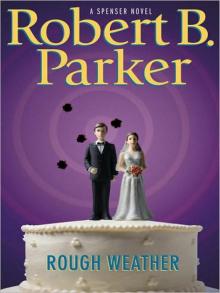 Rough Weather
Rough Weather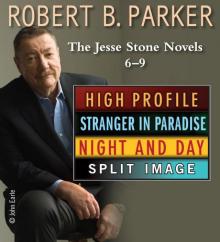 The Jesse Stone Novels 6-9
The Jesse Stone Novels 6-9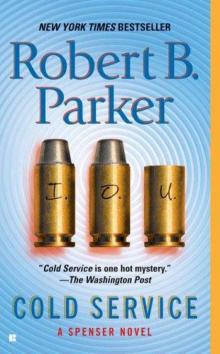 Cold Service s-32
Cold Service s-32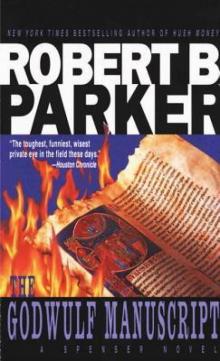 The Godwulf Manuscript
The Godwulf Manuscript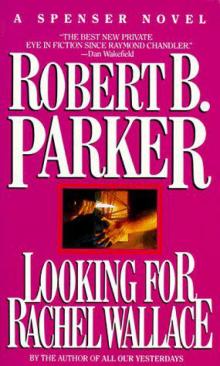 Looking for Rachel Wallace s-6
Looking for Rachel Wallace s-6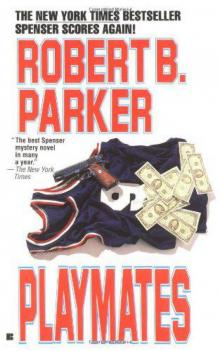 Playmates s-16
Playmates s-16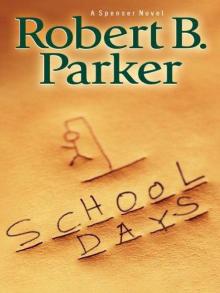 School Days s-33
School Days s-33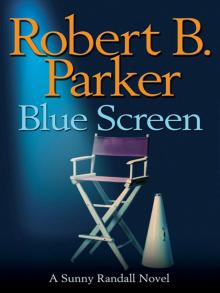 Blue Screen
Blue Screen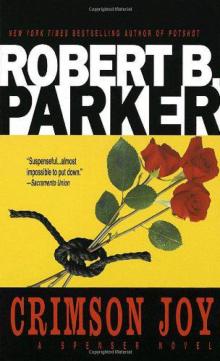 Crimson Joy
Crimson Joy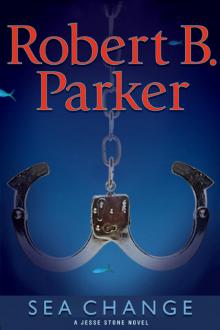 Sea Change js-5
Sea Change js-5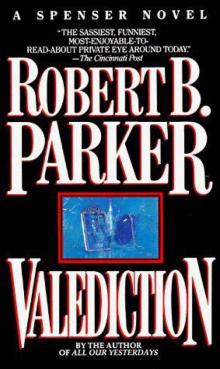 Valediction s-11
Valediction s-11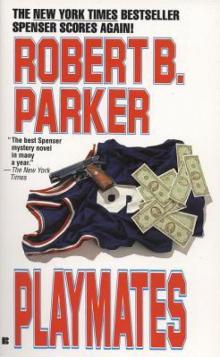 Playmates
Playmates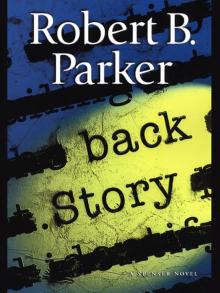 Back Story
Back Story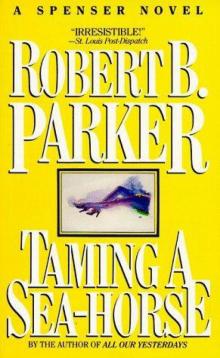 Taming a Sea Horse
Taming a Sea Horse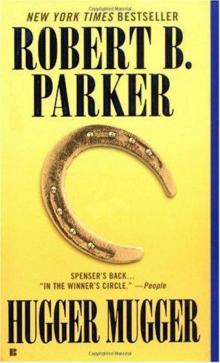 Hugger Mugger
Hugger Mugger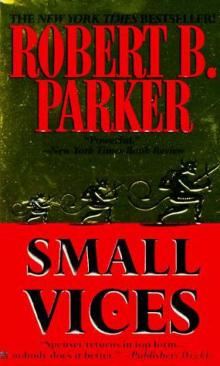 Small Vices s-24
Small Vices s-24 Silent Night: A Spenser Holiday Novel
Silent Night: A Spenser Holiday Novel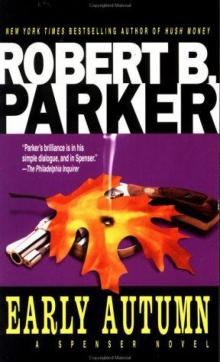 Early Autumn s-7
Early Autumn s-7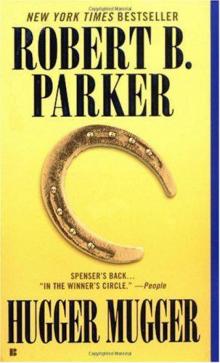 Hugger Mugger s-27
Hugger Mugger s-27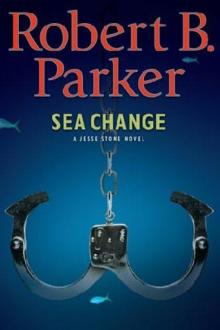 (5/10) Sea Change
(5/10) Sea Change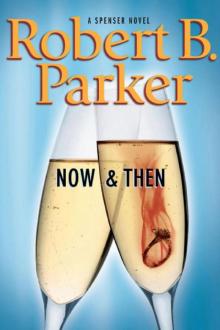 Now and Then
Now and Then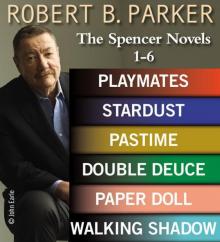 Robert B. Parker: The Spencer Novels 1?6
Robert B. Parker: The Spencer Novels 1?6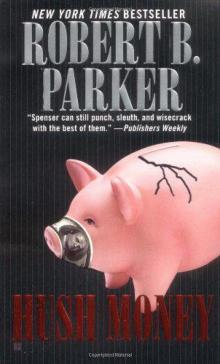 Hush Money s-26
Hush Money s-26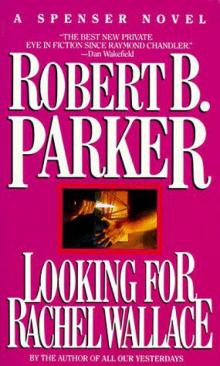 Looking for Rachel Wallace
Looking for Rachel Wallace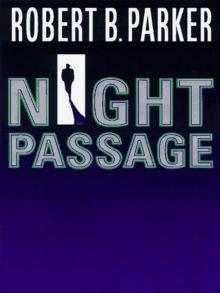 Night Passage
Night Passage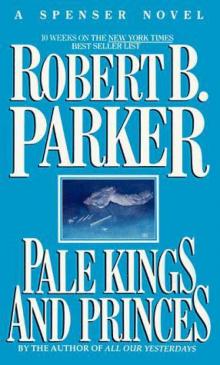 Pale Kings and Princes
Pale Kings and Princes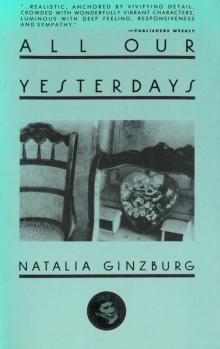 All Our Yesterdays
All Our Yesterdays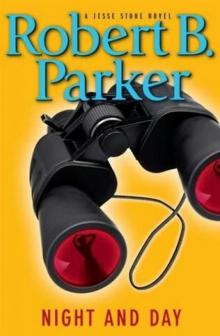 Night and Day js-8
Night and Day js-8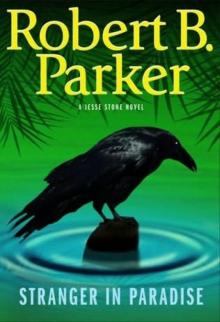 Stranger in Paradise js-7
Stranger in Paradise js-7 Double Play
Double Play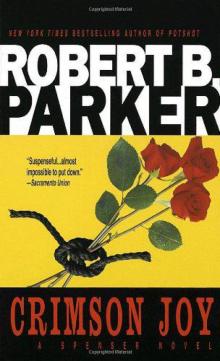 Crimson Joy s-15
Crimson Joy s-15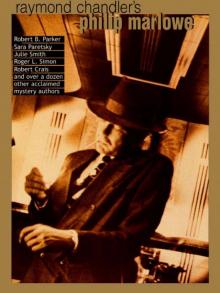 Raymond Chandler's Philip Marlowe
Raymond Chandler's Philip Marlowe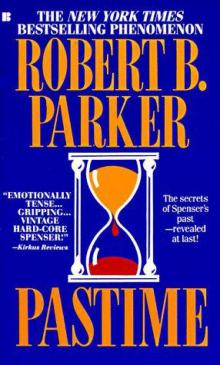 Pastime
Pastime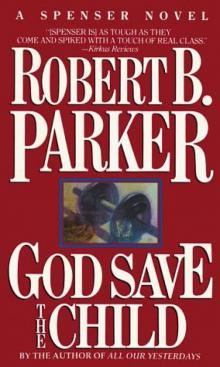 God Save the Child s-2
God Save the Child s-2 Bad Business
Bad Business Trouble in Paradise js-2
Trouble in Paradise js-2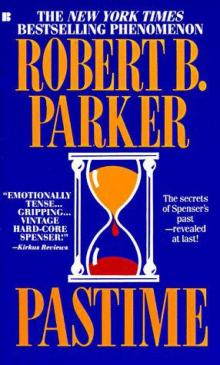 Pastime s-18
Pastime s-18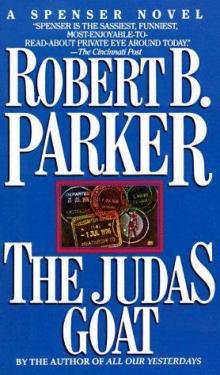 The Judas Goat s-5
The Judas Goat s-5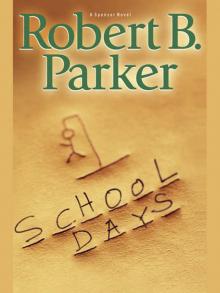 School Days
School Days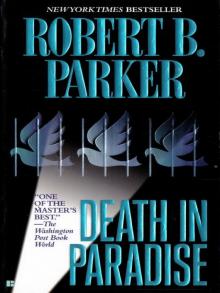 Death In Paradise
Death In Paradise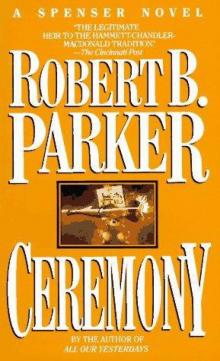 Ceremony
Ceremony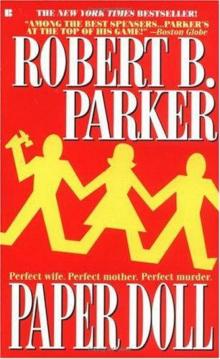 Paper Doll s-20
Paper Doll s-20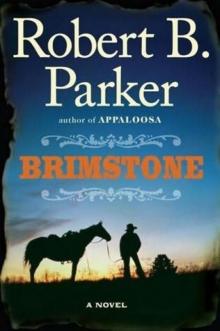 Brimstone vcaeh-3
Brimstone vcaeh-3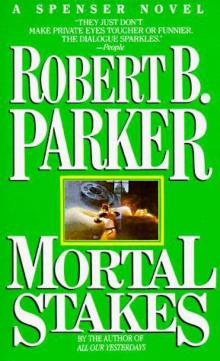 Mortal Stakes s-3
Mortal Stakes s-3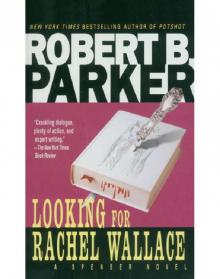 Spencer 06 - Looking for Rachel Wallace
Spencer 06 - Looking for Rachel Wallace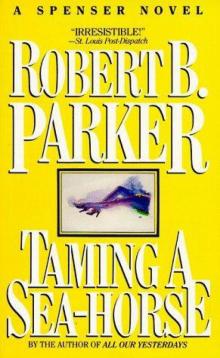 Taming a Sea Horse s-13
Taming a Sea Horse s-13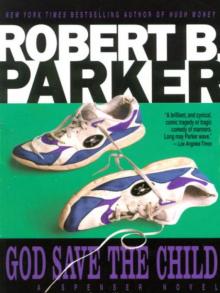 God Save the Child
God Save the Child Chance
Chance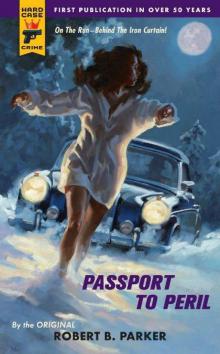 Passport To Peril hcc-57
Passport To Peril hcc-57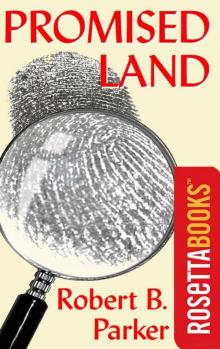 Promised Land
Promised Land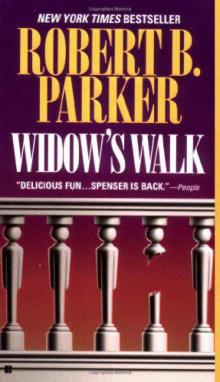 Widow’s Walk
Widow’s Walk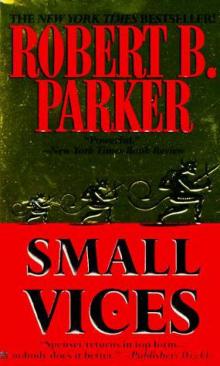 Small Vices
Small Vices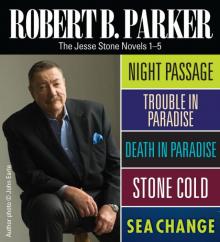 Robert B Parker: The Jesse Stone Novels 1-5
Robert B Parker: The Jesse Stone Novels 1-5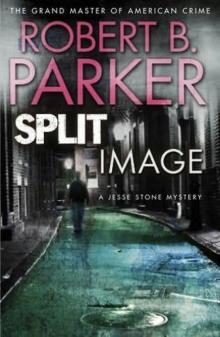 Split Image js-9
Split Image js-9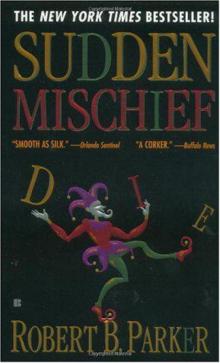 Sudden Mischief s-25
Sudden Mischief s-25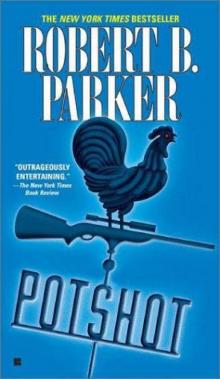 Potshot s-28
Potshot s-28 Split Image
Split Image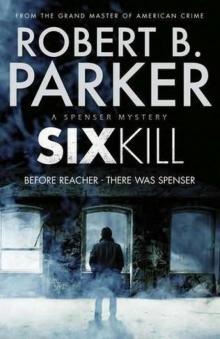 Sixkill s-40
Sixkill s-40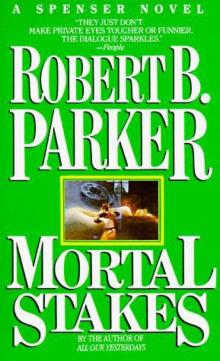 Mortal Stakes
Mortal Stakes Stardust
Stardust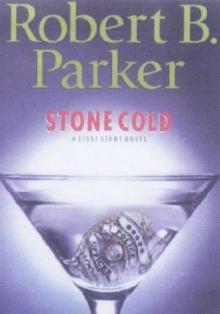 Stone Cold js-4
Stone Cold js-4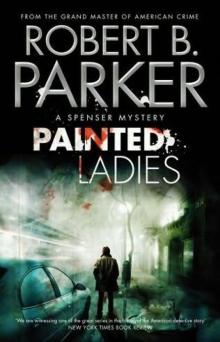 Painted Ladies s-39
Painted Ladies s-39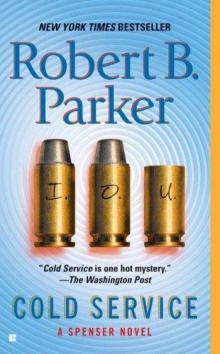 Cold Service
Cold Service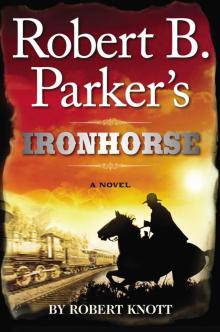 Ironhorse
Ironhorse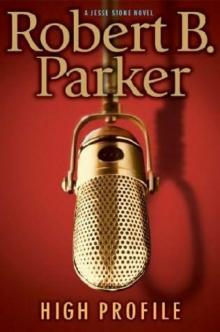 High Profile js-6
High Profile js-6 The Boxer and the Spy
The Boxer and the Spy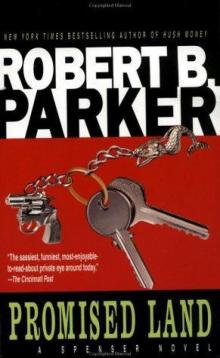 Promised Land s-4
Promised Land s-4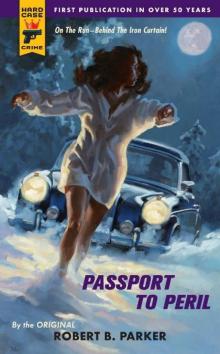 Passport to Peril (Hard Case Crime (Mass Market Paperback))
Passport to Peril (Hard Case Crime (Mass Market Paperback))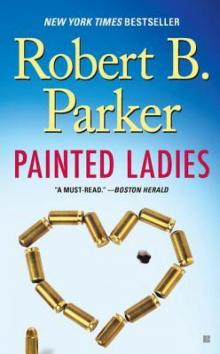 Painted Ladies
Painted Ladies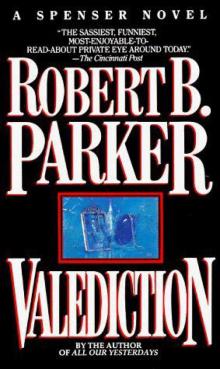 Valediction
Valediction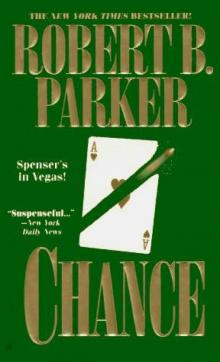 Chance s-23
Chance s-23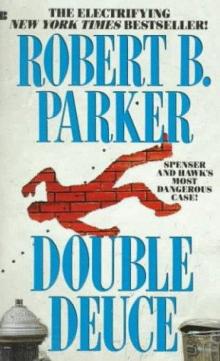 Double Deuce
Double Deuce Wilderness
Wilderness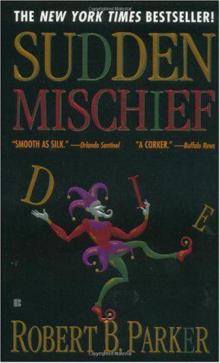 Sudden Mischief
Sudden Mischief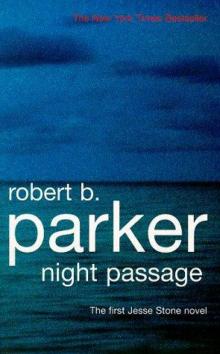 Night Passage js-1
Night Passage js-1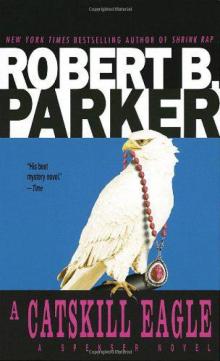 A Catskill Eagle
A Catskill Eagle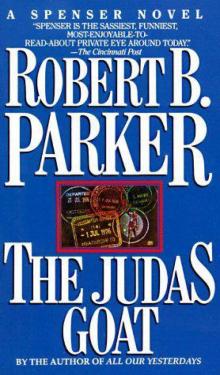 The Judas Goat
The Judas Goat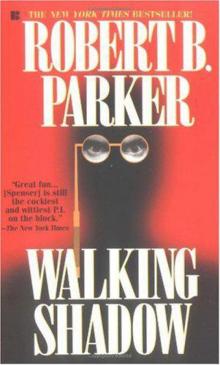 Walking Shadow
Walking Shadow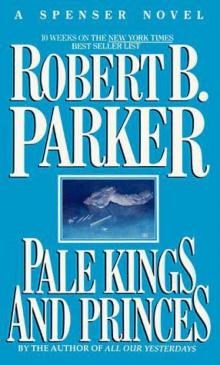 Pale Kings and Princes s-14
Pale Kings and Princes s-14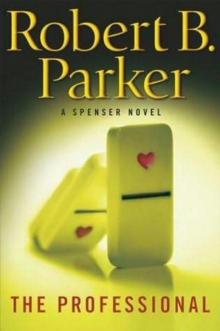 The Professional
The Professional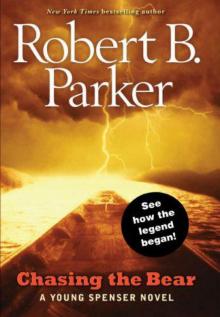 Chasing the Bear s-37
Chasing the Bear s-37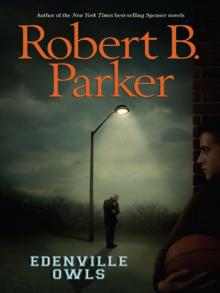 Edenville Owls
Edenville Owls Sixkill
Sixkill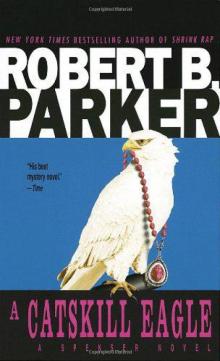 A Catskill Eagle s-12
A Catskill Eagle s-12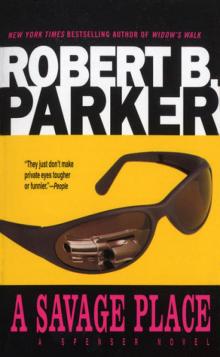 A Savage Place
A Savage Place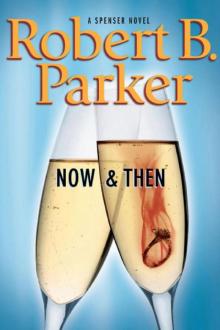 Now and Then s-35
Now and Then s-35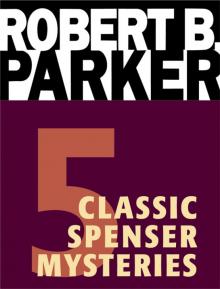 Five Classic Spenser Mysteries
Five Classic Spenser Mysteries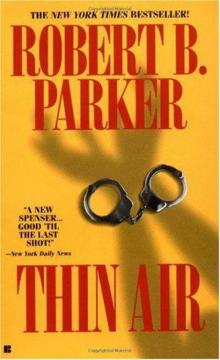 Thin Air s-22
Thin Air s-22